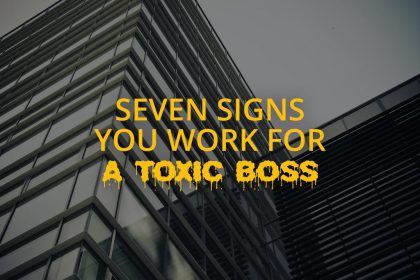Seven signs you work in a toxic workplace (and what to do about it)
Work can sometimes be stressful. But if you dread going in every day, you could be trapped in a toxic office. Here are seven signs your workplace is toxic – and what to do about it.
Modern management theory tells us to ‘individualise’ the work environment. This means that productivity and positivity at the workplace are based on individual employee – star employees are highly productive, and the bad apples ruin work for everyone.
At least, that’s what a recent Harvard Business School study found. However, more recent thinking is prompting many to people look at the whole workplace culture as the cause of toxicity detrimental to productivity.
Seven signs you work in a toxic workplace (and what to do about it)
The effects of a toxic workplace are acutely felt, but you may not necessarily attribute these to your work environment itself. So you oculus due working in a toxic office without even realising. And if that’s the case, what can you do about it?
To help you find out, here are seven signs to look out for – and advice on how to handle the toxic situation.
1) Simply being at work causes an incredible amount of stress
Work can be stressful at times for all of us. However, just being at work shouldn’t make you feel anxious or depressed. So if your workplace is causing psychological issues, it could be toxic.
Consider, for example, a young lawyer in London who once described working for her law firm as having a “dark cloud hanging over her head.” How do you describe your workplace to friends and family? What language do you use? And how often are you complaining about work, versus using positive language?
Toxic offices can cause severe anxiety, depression, sleep problems, and even physical illnesses in employees. And the only way to deal with an office like this is to remove yourself from the environment as soon as possible.
It’s highly unlikely you can change the entire atmosphere or culture at work, and if you stay to try you could worsen your mental health. So get out as early as possible, and find more healthy work environment.
2) There’s an informal pecking order
The corporate environment naturally has a hierarchy. But in toxic workplaces, there are informal hierarchies that are confusing to navigate.
You’re not sure who holds the real power – it may be that someone junior to you has built a close relationship with your manager, and uses that to leverage their own position, and bully you. (Often the easiest way for a bully to elevate themselves is to belittle others.)
They could even end up running the department (usually into the ground) by pulling a weaker manager’s strings. And, as these master manipulators only have the best interests of one person in mind (themselves) it makes for a pretty miserable workplace.
Over time, this invisible inter-colleague warfare can take a substantial toll on your happiness, confidence and the quality of your work.
Some people find it easier than others to overlook what’s going in, and can turn a blind eye and carry on. But you may find it more effective to formally report what is happening to the right people, if that is possible or appropriate. Or simply leave, before you confidence takes too much of a battering from the effects of this toxic person or people.
3) Publicly humiliating employees is the norm
Not long ago, a review of Amnesty International showed an alarmingly toxic workplace. Employees at the famous non-profit organisation described how top-level managers publicly humiliated subordinates, even for minor slights. Workers were belittled, yelled at, or called names right in front of their colleagues.
This is a classic sign of a toxic workplace, and a situation that’s sadly played out every day in offices across the world. So if a colleague or manager often ridicules or publicly criticises or questions the quality of your work (or another colleague’s), you could be working in a toxic workplace.
So what can you do? Dealing with public humiliation, or even witnessing it, can be extremely difficult. Instead of trying to brush over the incidents, you need to report them to the appropriate department.
Working with lawyers that sue companies and specialize in workplace harassment can help you navigate the process and hold the company accountable for fostering a hostile environment. Additionally, documenting each incident in detail can strengthen your case and provide solid evidence if further action is required.
If there’s a pattern of many small, public digs that individually don’t seem that bad, but collectively are causing a toxic atmosphere, then it’s a good idea to keep a diary of them, as this will help to build a picture of what is happening. Discussing incidents with colleagues you trust would help as well.
4) Working long hours with little satisfaction
Some jobs naturally require you to work long hours. But in some workplaces, staff are pressured or manipulated to stay at the office well after the working day has finished, for little or no real reason.
This is a common feature in toxic workplaces. It’s a power move – demonstrating that you have little control over what you want to do, and wearing down your energy and self-esteem by overworking you for no reason, and with no reward.
Sometimes you’re manipulated into working longer with the carrot of a pay rise, promotion, or selection for a popular project; but often these rewards never truly materialise. And by the time you suspect you may have been duped, your self-esteem has sunk to the extent you either don’t have the courage to challenge your manager, or you don’t believe you have the right to.
If this sounds familiar and you want to remain in your current job, then you can try to either stand your ground and leave at the end of your contracted day, attempt to negotiate better pay for the extra hours, or ask for flexible working hours.
But if this doesn’t work, or you don’t feel comfortable asking, for the sake of your confidence you’re better off getting out as quickly as you can, and finding a company who values and rewards your contribution. And remember: it’s not you, it’s them.
5) No one is allowed to speak their minds
While no one wants to work in an office where everyone is constantly moaning, a healthy work environment encourages honesty and fosters open communication. And employees are invited to voice their opinions and offer constructive criticism.
The toxic work environment is the complete opposite. Conversation is usually dominated by a handful of ‘alpha dogs’, and anyone attempting to challenge the agreed narrative is discouraged. If you do speak out you can find yourself the recipient of a verbal backlash, belittling or even being ostracised.
If you’re seen as a big enough threat, or a loose cannon (as they’d see someone who was compelled to speak the truth), you may find yourself being bullied out of your job. Toxic workplaces rarely sack people, instead they prefer to let them suffer slowly, watching an otherwise healthy, happy and confident colleague shrink into an insecure, unhappy and unhealthy shadow of their former self.
When you work in a toxic environment, keeping your head down becomes the norm. But it doesn’t have to be that way. If speaking your mind isn’t allowed, consider offering your opinion in writing, as it’s less likely to be perceived as confrontational. And if your immediate manager is the toxic colleague, consider writing to HR.
6) Bullying by managers is rampant
We associate bullying with the school playground. But sadly, some people never grow out of putting down and destroying other people, and carry their toxic tendencies into the workplace – with devastating effect.
Bullying can be overt, and obvious to everyone. But it can also be covert, and many people may not realise it’s happening to you. They might think your bully is a nice person, and you’re just being paranoid; a sense of isolation that just serves to exacerbate the impact of the bullying.
Bullying takes many forms, and it can even constitute some of the toxic behaviours we’ve already covered. And it’s not confined to one type of relationship – bullying can be from manager to team member, between colleagues, and even from team member to their manager.
Some signs of workplace bullying to look out for include using language that is uncalled for and insults to demean other workers. It’s not abnormal for a senior employee to lose their temper with a subordinate for what they perceive as sub-standard work.
The difference between normal office interactions and bullying is that bullies don’t stop with minor reprimands or vented frustrations; they aim to cause emotional harm.
If you are the victim of bullying at work, or if you witness this behaviour towards your colleagues, do report it to your human resources department. There are legal avenues to get help as well. ACAS also has helpful advice on dealing with workplace bullying.
But if you don’t start to see positive change, it’s probably worth quitting to save your sanity and self-esteem, as bullying can slowly strip you of self-confidence over time.
7) Promotions are rare or non-existent
Toxic workplaces function on a noxious combination of bullying, nepotism, and hypocrisy. And promotions at these kind of offices aren’t usually based on talent, but on who knows who – and who is top dog in the toxic hierarchy.
So, you could work diligently for years and never get promoted. And instead suffer the frustration of seeing junior, less able and deserving colleagues promoted above you just because they’ve managed to worm their way into a weak or toxic manager’s favour.
Not only is this unfair and bode ill for your team’s success (these people are rarely good managers, and will only take decisions that serve them in their new position of responsibility), but it can negatively impact your self-confidence.
So what can you do in workplaces where promotions are seemingly non-existent, or at least not offered to the most deserving? The answer is don’t wait to be asked! If you have a solid performance record, and believe you have a good case to make, ask to be considered for the promotion you want.
If your request keeps getting turned down, then it’s a sign that it’s time to move on to a company that genuinely values your contribution and rewards you accordingly.
Do you work with (or for) a narcissist?
If you have a narcissist in your office – or worse, running it – it’s highly likely that you’re experiencing a toxic workplace.
Read this article to discover the seven giveaway signs of a narcissist at work, and get advice on the best way to handle them.
Do you work in a toxic office?
If you experience any of the above signs at your office, then you are in a toxic workplace. And it’s likely that this environment will, over time, adversely impact your motivation, productivity, and dedication as an employee. Continuing to stay on at a bad workplace may also take a toll on your health.
So don’t wait until you’re forced out, fired or signed off on mental health grounds (all common in toxic workplaces). Instead, take control of the situation and either try to change your workplace or leave with your head held high – and find a better role in a healthier office.
Read advice to help you move on from a toxic workplace
You can find more helpful advice on spotting and recovering from a toxic workplace in these articles:
- The five types of toxic colleague (and how to handle them)
- Seven signs you work for a toxic boss
- Has your toxic workplace caused career burnout? Here’s how to recover
- Need to work out what you want to do next? Take our Career Audit and find out
Sandra Larson is an independent management consultant for small to mediums sized businesses. She routinely advises companies about increasing productivity levels by improving workplace culture. Sandra is also a writer and a blogger for Writix in her free time.
Photo by Sarah Diniz Outeiro










